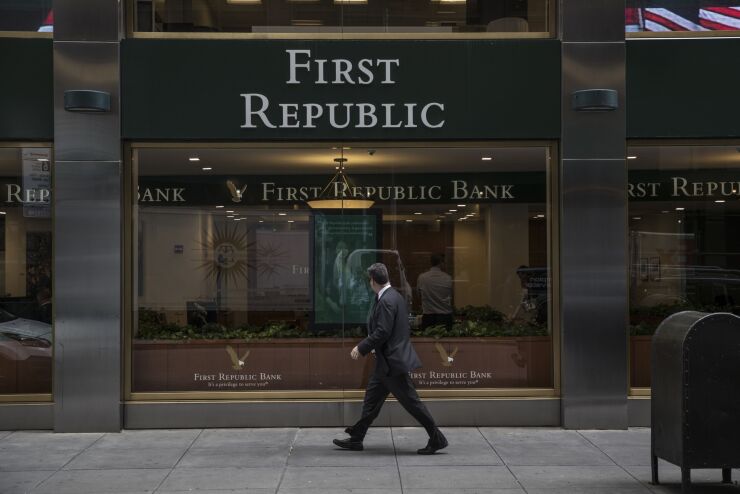First Republic Bank made its name catering to wealthy clients across California and New York, reeling in many with unusually sweet mortgages that eventually doomed the firm.
The system made its employees rich, too.
The San Francisco-based bank — which regulators seized and sold to JPMorgan Chase early this month — was paying dozens of employees more than $10 million apiece annually in the heyday before its collapse, according to people with knowledge of the situation.
Some racked up incentives for arranging home loans, amassing deposits and growing wealth management portfolios. For at least one unnamed banker who wasn't a top executive, the tally exceeded $35 million last year, the people said. That surpassed even what First Republic's new boss, JPMorgan CEO Jamie Dimon, was awarded for his 17th year running the nation's largest bank.
The eye-watering numbers show the role that incentives played in First Republic's unusual — and ill-fated — lending binge. Though the bank was widely known for offering generous rewards to staff, some potential rescuers were surprised by the compensation figures on display when the Federal Deposit Insurance Corp. granted access to the bank's data room days before the agency's emergency intervention on May 1.
First Republic's failure left the agency's main insurance fund facing a multibillion-dollar hit. That shortfall will eventually be plugged by a special fee imposed on the banking industry.
The company's incentive system helped drive up compensation for employees to an average of $310,000 apiece last year, according to regulatory filings.
While the amount actually paid to individuals varied widely depending on their roles, performance and the size of their client portfolios, the figure is more than double the norm at JPMorgan. And unlike its much-larger rescuer, First Republic wasn't a major player on Wall Street, the usual home of the industry's top earners.
Spokespeople for JPMorgan and the FDIC, which now control First Republic, declined to comment.
One thing that bidders examined in First Republic's final days was its mountain of jumbo, interest-only mortgages to borrowers with high incomes and credit scores. Customers' enthusiasm for those loans exploded during the pandemic, helping the firm double its size in four years — and ultimately making it the second-largest bank failure in U.S. history.
The mortgages, sometimes acting as a teaser for would-be clients, typically let buyers postpone paying down the principal for a decade, giving them more time to invest and grow their wealth. But the debts' low interest rates and slow repayment schedules caused their value to fall once the Federal Reserve embarked on a series of hikes last year, hollowing out First Republic's balance sheet.
By the end of December, First Republic said its loan portfolio would be worth about $19 billion less than face value if sold — more than the firm's tangible common equity. Depositors eventually fled, leaving the company to collapse.
JPMorgan has told remaining First Republic employees it plans to inform them of their fates later this month, Marianne Lake, co-head of JPMorgan's consumer and community bank, said in a presentation this week. There are three options, according to a person with knowledge of the process: They'll be invited to join JPMorgan indefinitely, for a specified period or not at all.
In its heyday, First Republic's eat-what-you-kill system lured teams of bankers from much larger rivals. Those employees wore a lot of hats: They could arrange mortgages, reel in deposits, tend wealth and get paid based on all of it.
Those who made home loans continued to earn a small percentage of the value of the loan each year, so long as the debt remained in good standing, one of the people said. While such incentives accounted for only part of what top earners reaped, the deals helped attract and strengthen relationships with clients, opening the way for more lucrative business.
A few examples of the millions that workers could collect are described in the firm's regulatory filings. U.S. rules require such disclosures when a firm pays relatives of top executives and board members.
Chief Credit Officer David Lichtman's spouse, an executive managing director in preferred banking, was paid $8.6 million in 2021, out-earning him, according to a proxy statement last year. The son of First Republic founder and former CEO Jim Herbert made $3.5 million that year as a senior vice president.
Still, to the extent that employees' annual compensation remained tied to the bank's shares, that portion was wiped out. The stock traded at $121.89 at the end of last year, when the firm had more than 4 million shares set aside to back long-term equity incentives. The price slumped to mere pennies when the bank failed.
Regulators and the Justice Department are now investigating whether anyone working at the firm used inside information to make stock trades as the bank headed for collapse.
—With assistance from Katanga Johnson and Steve Dickson.







